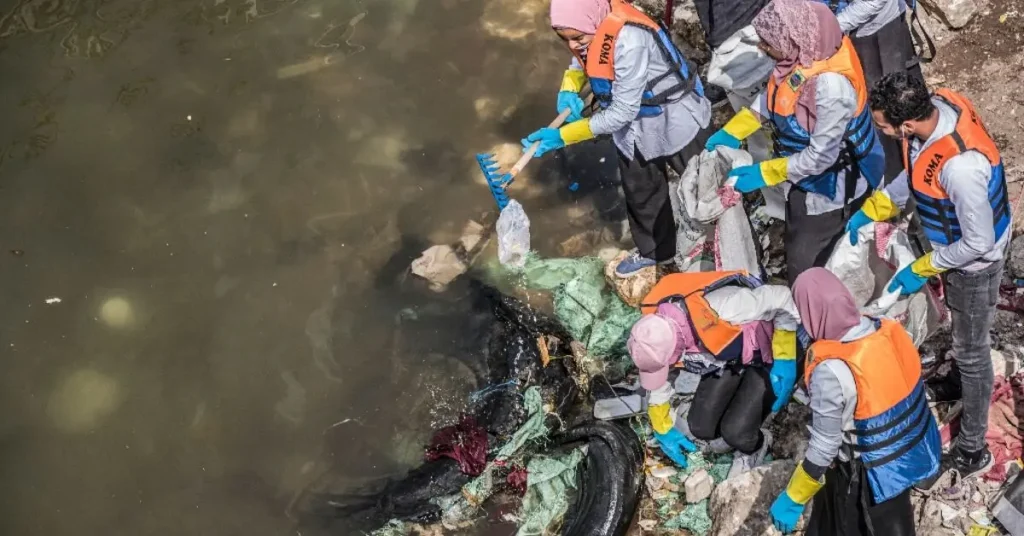In Egypt, a youth-led movement is transforming the fight against plastic pollution, turning Nile River waste into sustainable solutions. Startups like TileGreen and initiatives like VeryNile are recycling plastic bottles, food wrappers, and single-use bags, addressing the country’s status as the Middle East and Africa’s top plastic polluter, per a 2020 Science magazine study. Announced in January 2023, these efforts combat the three million tonnes of plastic waste Egypt generates annually, much of which clogs the Nile and Mediterranean, threatening marine life and human health. By 2025, these initiatives have scaled, but challenges persist, per World Bank reports.
TileGreen’s Innovative Recycling
At TileGreen’s Cairo outskirts factory, launched in 2021, entrepreneurs Khaled Raafat and Amr Shalan, both in their mid-20s, are revolutionizing plastic recycling. Their machines shred low-grade plastics—including hard-to-recycle food wrappers and layered plastic-aluminum products—into a thick liquid, molding it into durable outdoor pavers. “Each tile removes 125 plastic bags from the environment,” Shalan told AFP, with the bricks boasting twice the strength of concrete. By 2023, TileGreen had produced 40,000 tiles, aiming to recycle three to five billion plastic bags by 2025, per their mission statement.
The startup’s expansion into other cement-based products by 2025, reported by Egypt Today, reflects growing demand for sustainable alternatives. “We’re tackling even the toughest plastics,” Raafat said, slamming a tile for emphasis, highlighting their commitment to reducing landfill and river waste.
VeryNile’s Nile Cleanup Efforts
On Cairo’s Qursaya Island, VeryNile, founded in 2018, empowers fishermen to collect plastic from the Nile, paying them 14 Egyptian pounds (50 US cents) per kilogram for 10-12 tonnes monthly, per project manager Hany Fawzy. “Fishermen saw their catches dwindle due to pollution,” Fawzy noted, motivating their participation. High-value plastics like bottles are compressed into pellets for recycling, while low-grade waste powers cement factories with air-filtered incineration to avoid pollution. A 2020 Toxics study found 76% of Cairo fish contained microplastics, underscoring the urgency.
By 2025, VeryNile’s cleanups, including World Cleanup Day 2022, have expanded, with volunteers collecting tons of plastic, per Egypt Independent. “This is about our children’s future,” Fawzy said, emphasizing long-term environmental health.
Egypt’s Plastic Pollution Crisis
Egypt, with 104 million people, generates vast plastic waste, with two-thirds inadequately managed, per the World Bank. Microplastics in the Nile and Mediterranean, detected in 92% of Alexandria fish per a 2022 study, threaten ecosystems and seafood consumers. Egypt’s 2030 pledge to halve single-use plastic consumption includes new waste management plants, but progress lags, per Reuters. In Nigeria, facing 52.2% inflation in 2023, Egypt’s youth-led initiatives inspire hope, akin to Nollywood’s global cultural push.
Challenges and Hope
Globally, only 10% of plastic is recycled, with production set to hit 1.2 billion tonnes by 2060, per OECD. In Egypt, “these initiatives create a value chain,” said Mohamed Kamal of Greenish, but “they only scratch the surface.” TileGreen and VeryNile’s efforts, while impactful, face scale limitations. By 2025, partnerships with groups like the UN Environment Programme have boosted recycling, per UNEP, yet systemic change requires broader investment.






